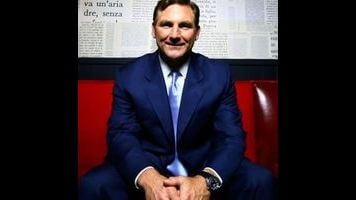30 For 30: “Run Ricky Run”

During the height of the Tiger Woods scandal, I scratched my head over all the editorializing about whether Woods’ career would “recover” from his public humiliation. I mean, c'mon. The guy’s an athlete, not a politician. Fans have forgiven athletes who’ve beaten their wives, driven drunk, and even violated the integrity of their own game by cheating or gambling. All Tiger Woods did was have sex with a lot of women. And it's not like his reputation has ever been built on his image as a family man or faithful husband. In fact, I’d bet if you’d polled 100 golf fans a year ago, a majority of them couldn’t have said definitively whether Woods was even married. I doubt a tenth of them would’ve known his wife’s name.
Or maybe I assume too much. Myself, I don’t demand much from athletes beyond that they play hard and treat their opponents with respect. From all that I’ve read over the years, I'm pretty sure I wouldn’t enjoy hanging out with most jocks. We wouldn’t have much in common politically or philosophically, or in our taste in pop culture. So I don’t expect them to be my imaginary pals. As far as I’m concerned, they don’t owe me jack-shit once they step off the field.
When Ricky Williams came out of the University of Texas, he was one of the rare athletes that I liked personally—or at least as “personally” as one can get through the filter of the media. I was maybe unduly impressed by all the reports that Williams loved Austin as much as I did, including its rock clubs and laid-back culture. Plus, I’ve always had a thing for big running backs who bull their way through a line and then hit the afterburners. I was enamored by the idea of this hulking giant with a zip in his step a spiritual core. And because of that, I was never scandalized or disappointed by any of the weird turns Williams’ life took. Testing positive for pot? Quitting the game? Hightailing it to Canada? All okay by me. It bothered me only that I didn’t get to see Williams play during those years in the wilderness.
Perhaps because of all that, I wouldn’t say that I needed “Run Ricky Run,” a 30 For 30 episode that’s practically an apologia. Williams never had to prove anything to me personally, and to my mind director Sean Pamphilon—who worked on this project for five years, starting with Williams’ first “retirement”—goes way too gooey at times with “Run Ricky Run,” with first-person narration that describes how Williams left football to “heal a damaged body and feed a searching mind” and how he “wouldn’t let me show you his wounds until they had a chance to heal.”
But I still liked “Run Ricky Run,” if only for the way Pamphilon structured the documentary as a direct rebuke to all those knee-jerk sports commentators who wrote Williams off over the years, offering dimestore analysis of the running back as lazy, or selfish, or an addict, or schizophrenic, or a walking obscenity. Pamphilon paints a different picture, noting that Williams suffered through an injury-plagued start to his career with Saints, and that in the years before he tested positive for marijuana, the Dolphins ran him ragged. (He actually set a record for the most carries in NFL history over a two-year span.) Add to that a troubled childhood dominated by a stern mother and a creepy father, and it all adds up to an athlete who’s been—at minimum—misunderstood.
Pamphilon doesn’t make Williams out to be completely blameless. Miami sports journalist Dan LeBetard (one of this documentary’s producers) points out that no matter how much Williams would like to think of himself as an individual just following his own path, he left “a wake of hurt,” and not only among fans who felt that he’d quit on them to go get high in the wilds of Australia. He also left behind girlfriends and children and his own family, and when Pamphilon asked back in 2005 if he missed any of them, Williams said “not really.” The Williams that Pamphilon spoke to back then was a moody, prickly dude, and not easy to warm to. He referred to himself as a seeker of truth who didn’t need money, which was easy for him to say with a few million in the bank.
 Keep scrolling for more great stories.
Keep scrolling for more great stories.
